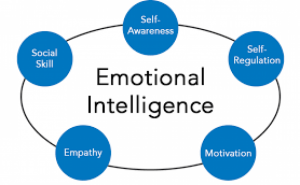Elements to Help You Develop Emotional Intelligence
Elements to Help You Develop Emotional Intelligence

To become a fireman requires a lot of efforts. It needs you to muster up enough courage to get yourself in and out of a burning building. It requires you to develop a heart to save humanity. Above all, it asks you to commit and be prepared to do everything you can to save the lives of others in tragedy. There are elements to help you develop emotional intelligence.
Let me tell you about Jason. He had all such qualities to become a successful fireman. He held the heart of a lion when it comes to saving lives. Jason was very compassionate and quite courageous. He had all the qualities that a good firefighter could’ve possessed.
Graduation was upon him and, Jason proclaimed that milestone as the most significant moment in his life. Despite knowing that he is one of the top-performing candidates in the firefighting institution, the moment he learned his wife is about to give birth, he skipped his graduation and drove a 15-hour ride back home.
Why would Jason take such an unprecedented step? Why would anyone miss such an honor as their graduation? Why do people take other such actions in life? What fuels them to risk everything that they have worked so hard for? Emotional Intelligence is the answer and the concept researchers identified back in the 1980s and 90s, which justifies these types of actions.
EI is what makes intelligent people make decisions based on their emotional understanding.

Here are five elements that you should adopt in your actions to become an emotionally intelligent person.
1) Create an Emotional Self Awareness
To develop emotional intelligence, one must first have a firm grip on self-awareness. When you don’t have self-awareness, you are like a sailor sailing a boat without any sails at the whim of the ocean of emotions. You let the tides sway your boat and set it to sail in any direction of the ocean’s choice.
You have to understand yourself on three different levels:
1) What you’re doing?
2) How do you feel about it?
3) Knowing where you stand emotionally?
Many of us don’t realize what we are doing in our daily lives. We are not paying attention, and we spent half our day checking up on our social media profiles, replying different emails, texting our closest friends, and then redoing it all over.
Without knowing it, all that we do in our routine becomes an addiction.
The routine begins to make us feel as if we are filled with anxiety and stress, and we allow that emotion to control us throughout the day. If there is an emotion which is present in your mind or body at any one moment, it’s because we created that emotion to be present there. By knowing where we are standing emotionally, it can help us find ways to help improve that emotion.
2) Keep Yourself Motivated to Combat Emotional Distractions
Look at the examples below:
- Have you ever felt this way?
- How would you handle the situation?
You took some time off work to get some extra chores done around your home. You need a break and decide that a 15-minute break is what you want to take. During your break you became lost in your thoughts and you’re in a quasi-hypnotic state. You glance over at the clock only to notice that it has been three hours. You have killed an enormous amount of time without even knowing it. Frantically, you get back to work to complete the tasks that you needed to get done.
Most writers wait for a funny bone to tingle before they settle down to get their writing assignments done. Some writers think they must be moved in some way so they can produce the creative stuff. Will your writing get done if you wait for the right inspiration?
I am not much of a fan to wait for that epiphany moment. Instead, I start writing, and then I motivate myself along the way.
One thing that I have realized is that emotional distractions will always be around to cloud your ability to perform. If you want to overcome those emotional distractions, you will have to do something about the original issue. That issue is EI. You will need to up your emotional intelligence so that emotions won’t hold you back or cause you to wait.
Get your head straight in the game, and do the tasks that you have at hand. You will find yourself along the way.
The only trick to do better at work is by staying positive and have fun doing what you do.
3) Channel Your Emotions the Right Way
You can’t control your emotions. They come and go as they please. However, when I tend to say, you can control your emotions, what I mean is how you can manage your feelings and your reaction to those emotions.
Emotions are more of an indicator. They allow us to understand which tasks are worth paying attention to and which of them aren’t. For example, a file submission meeting deadline is of priority, and when we haven’t completed that file, we tend to feel a little worried about completing it on time.
The emotion of worry is what motivates us to complete it before the task meets the deadline.
Similarly, anger can be a destructive emotion. But depending on how you plan to react to that anger is what sets you apart from others. You can either choose it to do injustice or to simply stop injustice.
Joy can be a constructive emotion. You can either be devastated at the loss of someone, or find joy in what you had and remember that part. You can feel joy and satisfaction in helping someone with their problems.
Knowing how you channel your emotions is what sets you apart from the rest.
4) Understand Emotions in Other People As if They Are Your Own
So far, what we have discussed is focused on addressing emotion in one’s own self. But what about understanding what the other person feels? After all, the whole point of developing emotional intelligence is to create healthier relationships with others, so they feel comfortable in your presence.
When you empathize with someone, it doesn’t mean that you can understand them completely. Instead, it is all about accepting the individual and the way they are — even though you don’t understand them.
It’s about understanding their pain as your own pain. It’s about helping them or giving them space.
Because good relationships are what, after all, define values. It makes us realize we are something much more significant and less complex compared to what the society believes or expects from us.
The post Elements to Help You Develop Emotional Intelligence appeared first on ReadWrite.
(147)

